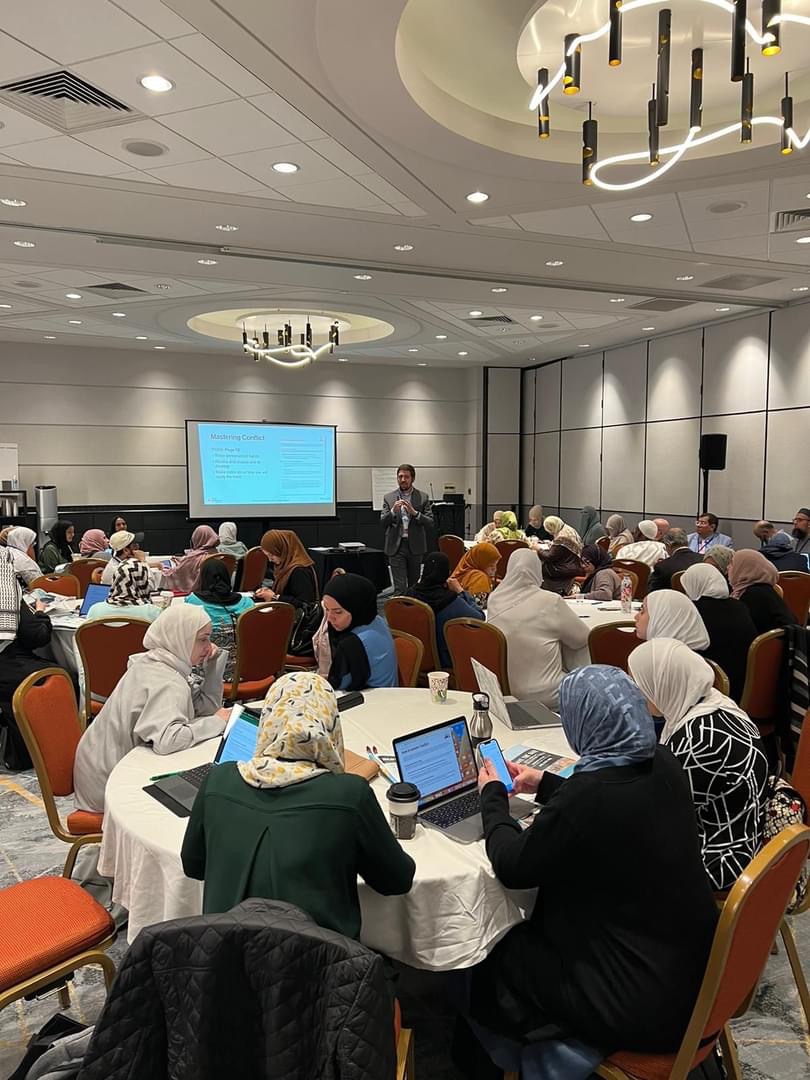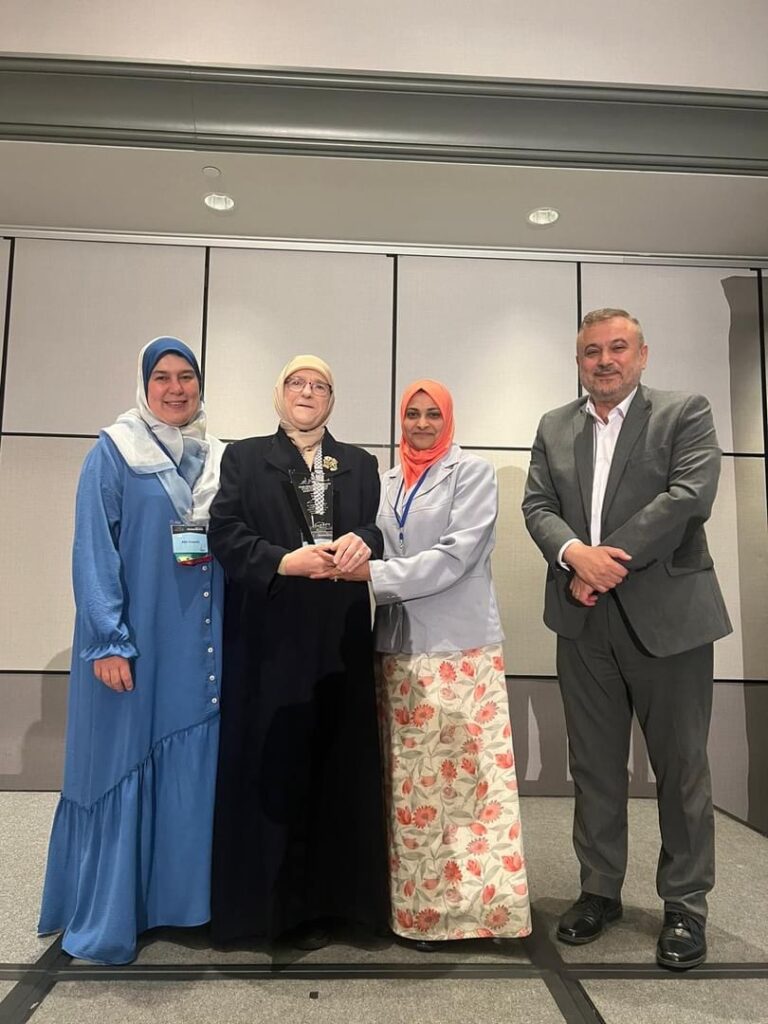ISNA Education Forum Celebrates 25 Years
By Islamic Horizons Staff
July/Aug 2024

More than 300 Islamic school teachers, principals, and administrators gathered in Chicago from May 10-12 for the silver jubilee of the ISNA Education Forum. Educators came from all over the country to learn from sessions led by experts in Islamic studies, Arabic, curriculum, leadership, and more.
In a pre-conference workshop, Rehenuma Asmi (executive board member of the Center for Islam in the Contemporary World) discussed how to address trauma, based on the hadith: “The believer is a mirror for the believer.” Attendees formed pairs and pretended to be each other’s mirror. She reminded them to affirm students’ emotions and not jump to solutions.
“College kids find it hard to self-regulate when parents have been hovering over them all the time. Kids must be given the opportunity to face challenges that will help them in the future,” Asmi said. “Kids shouldn’t feel they have to please someone to feel safe. It could be a trauma response to appease adults to get approval and security. Teachers should check if they actually want to do a task. They should let students know that “I’ll be there for you even if you’re not doing exactly what you’re supposed to.”
Arshiya Shaikh from Al Hidaya School in New York shared what has worked for them. “Let kids ask why, instead of being just told what. Allow kids to sometimes guide teachers,” Shaikh said. They have a 7:1 student to teacher ratio at their school because they believe teachers are the essence of the classroom. “Teachers must be seekers of knowledge too. They should be a murabbi (guide) in a state of calmness.” For that they implement sakeenah circles and teach the 99 Names of Allah with meaning. They have cozy corners for children to self-regulate. They are not a time out or punishment. They believe that some kids just need time and space without too many toys and distractions.
Award-winning children’s author, Rukayat Yakub shared how schools should also focus on good character and uprooting toxic values. “Kids memorize the Quran, but don’t hold the door open for others. We are preaching Islam with our actions,” Yakub said. “Reimagining is using heart work by uprooting toxic values like greed, anti-blackness, and arrogance and replacing them with knowledge, love and belonging.”
She talked about ethical wealth flow by stressing that all mosque or Islamic school board members should not come from the same zip code. The current political climate, she stressed, is making it clear that there are some prejudices that even many Muslims are unaware of.
At the Celebration Banquet, ISNA President, Safaa Zarzour presented Seema Imam, Ed.D, with the Lifetime Service Award. She served as The Universal School founding principal and has 21 years of experience in the Chicago Public Schools. She has served as chair of the Islamic Schools League of America (ISLA) for 4 years and continues serving her 27th year on the board.

award.
“As Islamic school educators, we may not be the highest paid in earthly dollars, but may we be among the higher paid in the Hereafter,” said Imam. “Teachers have their thumbprint on the future of Muslim American children. We cannot be paralyzed. We cannot despair. We must stand firm on our mission. If you ever feel alone, lean on your ISNA Education Forum family.”
Attendees enjoyed the keynote address by Khalifa Muhammad, PhD, Executive Director of Urban and Rural Initiatives at Ohio State University. He advised educators to truly share power with the people they serve. “Effective leadership comes from collective multiple stakeholders with equitable power,” he said. “All knowledge doesn’t have to come from the top. The Prophet (salla Allahu alaihi wa sallam) also took advice from the sahabah (Companions).”
He said teachers should not be hired only based on a piece of paper. Their character is of utmost importance too. He shared how principals are responsible for over 25% of a school’s effects on student learning and the development of teachers which accounts for 33% of the effects on learning.
Attendee Feedback
Lina Aljijakil, assistant principal of The Islamic School of Louisville found the leadership sessions very practical. “I enjoyed learning about the five behaviors of a cohesive team. I need to give my team a chance to talk even if I know the answer,” she said. “When the idea comes from them, they are more accountable.”
“I have a million ideas I must implement from what I learned at the forum. I’m very happy there were sessions dedicated to weekend schools. I learned a lot of skills that can help me with my teaching methods,” said another teacher.
“This was my best year. When I think about what it takes to be a Muslim, I think we are supposed to unite, connect, and love one another. I think we had the opportunity to do all three this weekend. I loved the variety of the sessions we offered this year. The topics really connected with us,” said Quran Shakir, ISLA board member.
A teacher visiting from Cairo commented that she was quite impressed with the forum and the multitude of opportunities to network with educators from across the country. She is scheduling her next US visit to coincide with the 2025 Education Forum.
“I was very happy about the presentation on social emotional intelligence,” said an attendee from San Antonio. “You don’t have to look for buzz words. They all have a foundation in Islam. It was great to also learn more about the Sister Clara Muhammad schools.”
“The Education Forum did a far better job than the engineering/scientific conferences I’ve been to,” said one attendee from Al-Ihsaan Islamic School. “I was going to give up on the idea of opening a school, but the forum gave me the faith needed to stay on course.”
Teaching About the Palestinian Struggle in Islamic Schools
The ballroom filled up for a special session on Navigating Jerusalem and Palestine in Islamic Education. The panel consisted of ISNA President, Safaa Zarzour, Palestinian journalist Deanna Othman who teaches high school English as well as a course on media and culture at Universal School, and award-winning principal, Habeeb Quadri, superintendent of MCC Academy. They each shared tips on how to teach Muslim kids about the ongoing genocide and the history of injustice in age-appropriate ways.
“Jerusalem is a matter of faith, our aqeedah (creed) not history,” Zarzour said, whose wife is from Gaza and still has family in Jabalia. “There is no other place we know of where so many prophets gathered in prayer.” He encouraged the audience to ally themselves with people who stand up for justice. He talked about how language makes a difference in dehumanizing an issue. He quoted award-winning author Moustafa Bayoumi, “It is the peculiar fate of oppressed people everywhere that when they are killed, they are killed twice: first by bullet or bomb, and next by the language used to describe their deaths.”
“We have 56 countries represented at MCC,” Quadri said. “Kids find different ways to respond based on what they hear at home versus the mosque versus Shaykh Google.” He suggested that little kids can be introduced to the issue by wearing the colors of the Palestinian flag or making cards. A guest speaker can be invited for older students who can talk about the history of America’s protests in the civil rights and women’s rights movement. He advised using infographics instead of any graphic photos when talking to children.
He also shared how older students need to be taught how to use social media responsibly as they can get into trouble for being too emotional online. School counselors should work with scholars and be trained to address the issues. He said parents can email teachers privately and let them know if they have loved ones in Palestine and how it could be weighing on the kids
“It was a struggle for me personally as we had just visited Gaza the summer before,” Othman said. “We need to incorporate Palestine into our curriculum, not just talk about it during Islamic Studies. American Muslims for Palestine (ampalestine.org) has resources for educators so that older students can be well-versed with terms like apartheid, settler colonialism, siege, genocide, ethnic cleansing, and orientalism.”
She also warned about students being careful about their online footprint as it can have damaging consequences. Students should also be taught media literacy by encouraging them to check the source of a story before believing or sharing it. She said in these troubled times, narratives must be challenged. Kids should not feel that a good Muslim does not go to encampments and protests, and that only bad Muslims ruffle feathers.
The session ended with an uplifting message from Shaykh Abdalla Idris Ali, a former ISNA president who also served as the principal of the Mississauga, Ontario based ISNA Islamic Community School for 17 years. “We have been reading dua qunoot with each prayer since October 7th. We have seen what happened to Pharaoh. We just have to trust God’s timing.”
The Education Forum Program Committee was co-chaired by Abir Catovic and Azra Naqvi. Other members of the committee included Susan Labadi, Salah Ayari, Ziad Abdulla, Farea Khan, Leila Shatara, Magda Elkadi Saleh, Tabasum Ahmad, Humza Mohammed, and Mukhtar Ahmad.
Tell us what you thought by joining our Facebook community. You can also send comments and story pitches to horizons@isna.net. Islamic Horizons does not publish unsolicited material.
